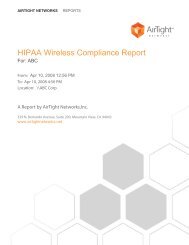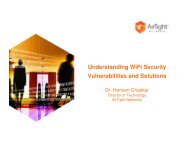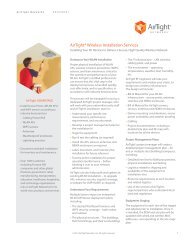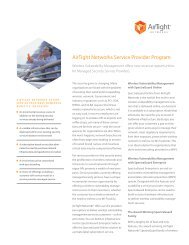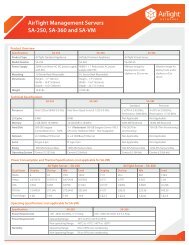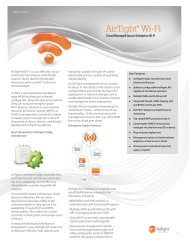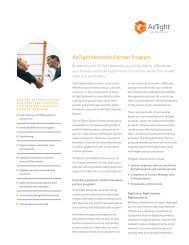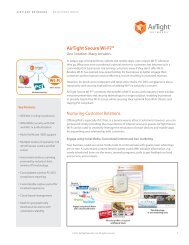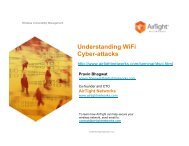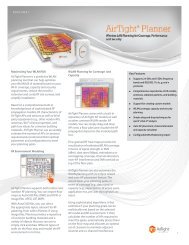Sarbanes-Oxley Compliance and Wireless LAN ... - AirTight Networks
Sarbanes-Oxley Compliance and Wireless LAN ... - AirTight Networks
Sarbanes-Oxley Compliance and Wireless LAN ... - AirTight Networks
You also want an ePaper? Increase the reach of your titles
YUMPU automatically turns print PDFs into web optimized ePapers that Google loves.
<strong>AirTight</strong> <strong>Networks</strong><br />
WHITEPAPER<br />
<strong>Sarbanes</strong>-<strong>Oxley</strong> <strong>Compliance</strong> <strong>and</strong> <strong>Wireless</strong> <strong>LAN</strong> Security<br />
If the employee has connected to a Linksys, Netgear or other home or hot spot access<br />
point using the default SSID, it will automatically connect to another AP with the same<br />
SSID without the user being aware of the connection.<br />
Secondly, neighboring Wi-Fi networks can spill into the enterprise <strong>and</strong> curious users<br />
connect to these open, insecure, <strong>and</strong> distrusted networks while still connected on the<br />
wired side of the trusted network. Users may also connect to these networks if their<br />
internal network firewall does not permit POP email accounts, does not permit access to<br />
certain web sites, or they do not want their outbound traffic monitored.<br />
Ad Hoc Connections<br />
<strong>Wireless</strong> clients can also create peer-to-peer connections. A peer-to-peer connection can<br />
be exploited by a malicious hacker who may try to then inflict a variety of attacks on the<br />
client such as port scanning to explore <strong>and</strong> exploit client vulnerabilities.<br />
Malicious <strong>Wireless</strong> Threats<br />
Evil Twin/Honey Pot Access Points<br />
Malicious hackers are known to set up Honey Pot APs with default SSIDs (e.g. Linksys,<br />
Netgear, default, any etc), hotspot SSIDs, <strong>and</strong> even corporate SSIDs outside of buildings<br />
<strong>and</strong> watch a large number of clients automatically connect to the AP. These APs can then<br />
inflict a variety of attacks on the client or attempt password stealing by presenting a login<br />
page to the client over the mis-associated wireless connection.<br />
Rogue Clients<br />
Rogue clients are those that are unauthorized to attach to an authorized corporate<br />
wireless network. This may occur through an authorized access point that has been<br />
mis-configured with encryption turned off, or through an access point that has had<br />
its encryption/authentication compromised <strong>and</strong> uses the key to connect to a properly<br />
configured authorized access point.<br />
Denial of Service Attacks<br />
A danger to any enterprise, denial of service attacks are a threat that can wreak havoc on a<br />
large number of users simultaneously. There are various forms of wireless denial of service<br />
attacks, but they typically involve flooding a channel or channels with deauthentication<br />
or similar packets that terminate all current <strong>and</strong> attempted client associations to access<br />
points. Denial of service attacks can be particularly destructive to voice over Wi-Fi<br />
applications, completely halting the conversation.<br />
© 2012 <strong>AirTight</strong> <strong>Networks</strong>, Inc. All rights reserved. 6




